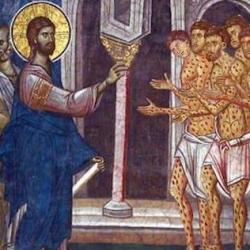In his study of The Concept of Purity at Qumran and in the Letters of Paul, Michael Newton argues that Paul transfers the logic and patterns of purity and cult from the temple to the new temple-community, the church. Relying mainly on Corinthians, Newton writes:
“By describing the Christian community as the Temple of God, Paul transfers from the Jerusalem Temple many concepts that pertain to that institution. Of primary importance is the idea that the divine presence now dwells wherever those who are ‘in Christ’ gather. Whereas God’s Spirit previously had its special dwelling in the sanctuary of the Temple in Jerusalem, it is now, in Paul’s view, with the Church, which is described by Paul as God’s Temple. Furthermore, Paul uses language which suggests that he sees himself performing a priestly duty for this Temple and, in addition, sees the individual believers as not only performing a priestly function but also, paradoxically, presenting themselves as sacrificial offerings. All of this has been made possible, in Paul’s mind, by the sacrificial death of Christ which has put an end to the efficacy of the atoning sacrifices of the Jerusalem Temple and has enabled God’s Spirit to be forever present within the believing community. However, just as conditions were laid down for the maintenance of the divine presence in the Holy of Holies in Jerusalem, so Paul sets out stringent conditions for the Christian community in order to preserve purity and thus maintain God’s presence” (77-8).
Paul details food laws and rules of fellowship, describes sexual immorality as a “defilement” of the holy house of the church. In all these ways, “Paul use of the concept of purity . . . elucidates the concept of the Church as the Temple of God within which God’s presence depends on the purity of the surroundings, and . . . serves as a disciplinary device in order to maintain ethical standards within the community” (113). That temple is no longer in a single location, but takes shape wherever holy ones gather. But where such a people-temple is found, there Paul insists on the need to maintain purity, or suffer the fate of the temple – the departure of the Spirit.















